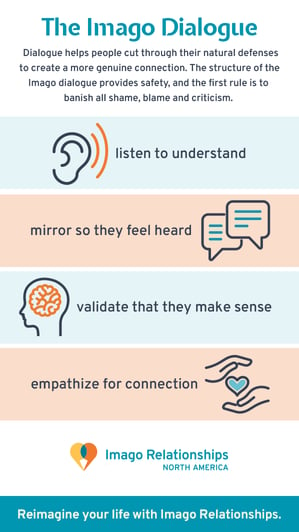
Congratulations! If you are reading this, you have probably decided to seek help for your relationship. And this is often a difficult decision.
If things are not going well in our intimate relationships, it can feel like a very personal failing.
Many of us prefer to do things on our own or feel that it is a weakness to seek help from others.
The truth is, most of us have not had very good role models for a healthy relationship, and few of us have been taught the skills necessary to have a truly thriving relationship.
Relationships are like any other endeavor – we need to have knowledge and skills to be successful!
What should you expect from
Couples Therapy?
Tip #1 - Better Communication.
You should learn new skills to help you communicate more effectively and navigate the relationship road's inevitable bumps. In Imago, we use the "Intentional Dialogue" as our primary tool. This method has been used and refined for over 25 years, and has been the standard by which many other approaches have followed. You will learn to listen deeply to your partner and manage your reactivity in ways that allow both of you to feel safe, heard, and understood. This is an essential skill that leads to relationship success.

Tip #2 - Truly Understand the Core Issues.
You should gain an understanding of your "core issues." In my experience, every relationship has just 2 or 3 core issues that come up over and over again. These issues can turn what is essentially a great relationship into a nightmare! When these issues get triggered, we can become so hurt and angry that we forget all of what is good in the relationship.
-
Feeling under-appreciated
-
Feeling disconnected to our partner
-
Feeling smothered by our partner
-
Feeling controlled by our partner
-
Losing our sense of independence or sense of "Self" and so on.
Couples therapy will help you identify what the core issues are that are operating in your relationship. It will also help you understand why those issues are there and how you can not only end the pain but also get your needs met in ways that you may have never experienced before in your life!
Tip #3 -Relationship Growth.
You should learn how to grow in your relationship. We believe that relationship is both our greatest source of satisfaction and our greatest source of challenge. Intimate relationships often force us out of our comfort zone. They require us to see the world through our partner's eyes and to "stretch" into parts of ourselves that may be undeveloped.
For example, if your partner is the more "emotional" one in the relationship, they may be calling you to stretch into awareness of your own feelings and emotions.
If your partner is the more logical/rational one in the relationship, you may be called on to learn to contain your emotional reactions and to develop your rational side further. When we stretch to meet our partner's needs, we "grow ourselves up." But first, we have to…
Tip #4 - Learn to be a more generous, loving, and giving partner.
Marriage or couples counseling is not just about solving problems or resolving conflict. It will also help you enhance the positives deepening your connection, and your ability to give and receive love more fully. We can all learn to be more loving, generous, patient, accepting, and so on.
I hope these four tips help you and your partner get more connected and grow your relationship. Every couple is different, and effective therapy will address your particular needs as a couple. It is more flexible now than ever with online therapy for couples as well.
I am hopeful these general principles that I have found to apply for most couples and most couples therapy are helpful. If you're still struggling in your marriage or relationship and ready to learn and grow more, we are always here to help. Check out our Imago Relationship workshops and therapy. We also have Online Couples Workshops right now!
Discover more about Imago with our Imago Professional Membership, Imago Professional Facilitators, Imago Professional Training and Imago Educational Webinars.
Connect. Transform. Thrive.
 This blog post was written by Ben Cohen, Ph.D.
This blog post was written by Ben Cohen, Ph.D.

